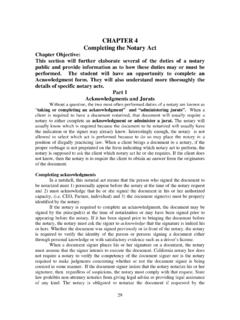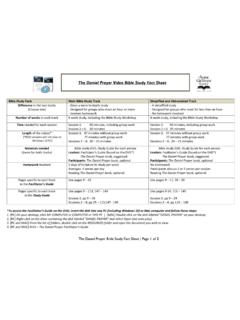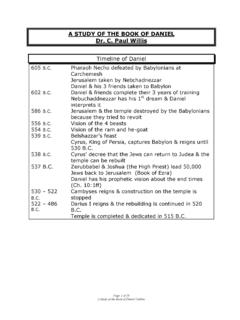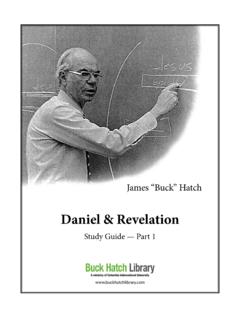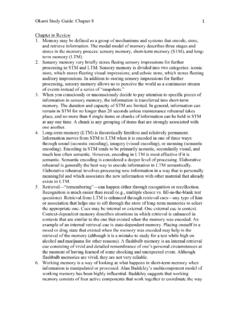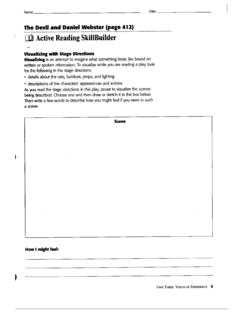Transcription of Pre Seminar Guide CALIFORNIA NOTARY LAWS & EXAM …
1 Pre Seminar Guide CALIFORNIA NOTARY laws & EXAM PREPARATION NOTARY Public Pre Seminar study Guide Chapters 1 & 2 for Preview Daniel C. Jones, ; NOTARY Public Copyright 2014 All rights reserved Rev 11/02/14 CALIFORNIA NOTARY laws and Exam Preparation Pre Seminar Guide 2 | The full Pre Seminar study Guide is available to anyone registering for a NOTARY class. All registrants also have full access to our on line NOTARY video/slide course without charge. Our NOTARY educational company is very committed to helping our students pass the NOTARY exam the first time around! We are less expensive and offer far more for your money. Consider registering with us for your NOTARY education and see what a difference we make.
2 TABLE OF CONTENTS Chapter 1 The Office of the NOTARY Public .. 3 Chapter 2 Becoming a NOTARY Public in CALIFORNIA .. 8 Chapter 3 Independent Notaries and Employee Notaries .. 19 Chapter 4 Completing the NOTARY Act .. 24 Chapter 5 Proper 34 Chapter 6 The NOTARY Journal and Seal .. 44 Chapter 7 Miscellaneous NOTARY 51 Chapter 8 Allowable NOTARY Fees .. 55 Chapter 9 Civil, Administrative and Criminal Penalties .. 56 The NOTARY 56 The Answer Key .. 71 CALIFORNIA NOTARY laws and Exam Preparation Pre Seminar Guide 3 | CHAPTER 1 THE OFFICE OF THE NOTARY PUBLIC What is a NOTARY Public? The NOTARY public office exists primarily to protect the public by helping to minimize fraud.
3 CALIFORNIA Government and Civil Codes describe most NOTARY requirements and conduct. The CALIFORNIA Secretary of State may appoint notaries public as necessary for the public convenience. Notaries in CALIFORNIA are generally commissioned for a period of (4) four year terms after which a NOTARY wishing to re commission must re apply for another term. Notaries typically serve the entire four years unless they have been appointed to a military base or a public entity such as a school district. Geographical Limitations for Providing Service Except for notaries who are appointed on a military base, notaries commissioned in CALIFORNIA may notarize documents anywhere within the state of CALIFORNIA , but only while physically present in the state of CALIFORNIA .
4 Notaries who are appointed to a naval or military reservation are limited to providing services only within the boundaries of that reservation. Governed by the laws of CALIFORNIA A CALIFORNIA NOTARY is governed by the laws of the State CALIFORNIA which is important to know if notarizing signatures on documents that originate from other states or countries. Indeed, CALIFORNIA notaries may perform NOTARY services for clients with documents that originate anywhere and even in any language whether or not the NOTARY understands the language. This is because a NOTARY seal on a document concerns the signature process and guarantees that notarial procedure was followed CALIFORNIA NOTARY laws and Exam Preparation Pre Seminar Guide 4 | regarding the signing of the document but does not guarantee or legalize the contents within the document.
5 So, if there is no place on the document for someone to sign, the NOTARY has nothing to notarize. However, other states and countries may expect or require that a NOTARY in that state or country perform an action that is illegal for a CALIFORNIA NOTARY . For example, they may want a NOTARY to place a NOTARY seal on a document that does not need to be signed. CALIFORNIA notaries must follow CALIFORNIA NOTARY laws and may never comply with notarial requests that are prohibited by the CALIFORNIA Secretary of State. This also means that a CALIFORNIA NOTARY only needs to learn CALIFORNIA NOTARY law and not the NOTARY laws of every other state or country. Impartial Witness A NOTARY may never notarize his or her own signature (obviously) but also may not notarize any signatures on any document which the NOTARY has a direct beneficial or financial interest.
6 The NOTARY must always remain an impartial witness. Beneficial interest applied to specific circumstances Sometimes it is not always easy to determine whether or not a NOTARY has a beneficial interest in a document. There are some specific guidelines directly from the CALIFORNIA Secretary of State that notaries should use to help determine when they would have a beneficial or financial interest. With respect to a financial transaction, a NOTARY , acting in the capacity of an attorney, agent, employee, insurer, escrow, or lender for the person having a direct beneficial or financial interest in the document has NO beneficial interest in the transaction and MAY notarize the document. Financial interest applied to specific circumstances With respect to real estate transactions, a NOTARY who is named individually as a Grantor, Grantee, Mortgagor, Mortgagee, Trustor, Trustee, Beneficiary, Vendor, Vendee, Lessor, or Lessee to the transaction IS determined to have a beneficial or financial interest in the document and may NOT notarize that document.
7 CALIFORNIA NOTARY laws and Exam Preparation Pre Seminar Guide 5 | Notarizing for spouses, domestic partners and relatives As long as the NOTARY does not have a beneficial or financial interest in the document, a NOTARY is permitted to notarize for a spouse, domestic partner, or relative, the NOTARY should be very cautious concerning these documents, especially documents that may relate to community property. If the NOTARY is in doubt as to whether or not to notarize, the NOTARY should consult an attorney. General Guidelines for the Duties of a NOTARY Public When notarial services are required, the NOTARY will complete a NOTARY Act . Regardless of the specific NOTARY act, there are always general notarial procedures that must always be followed.
8 The signer must personally appear before the NOTARY public. The NOTARY must properly identify the person who appears for notarization. The NOTARY must complete a journal entry for every NOTARY act performed. The NOTARY must truthfully complete correct notarial verbiage on the document or, if necessary, attach the completed verbiage to the document. The NOTARY must use an official NOTARY seal (stamp) to complete the NOTARY act. Taking Acknowledgments and Administering Jurats The two most often completed NOTARY acts taking an acknowledgment and administering a jurat. We will go into great detail concerning both of these in Chapter 4 so all we need to do for now is to briefly describe the differences.
9 Taking an acknowledgment means that a document signer acknowledges signing the document before the NOTARY whereas administering a Jurat requires that the document signer swears or affirms the truthfulness of the document before a NOTARY . Most notaries take many more acknowledgments than they do administer jurats, but these two NOTARY acts together make up the overwhelming majority of the NOTARY s duties. CALIFORNIA NOTARY laws and Exam Preparation Pre Seminar Guide 6 | Certify a copy of a Power of Attorney A Power of Attorney is a document that grants the legal authority for someone to sign on behalf of another person. Quite often, for example, a spouse may execute a Power of Attorney to the other spouse in case documents must be signed when one spouse cannot appear before a NOTARY at the time of notarization.
10 Certifying a copy means that the NOTARY compared the original document to the copy and the copy is certified to be a true and exact representation of the original document. CALIFORNIA Probate Code (not the CALIFORNIA Government or Civil Code) determines that a Certified Copy of a Power of Attorney will have the same force and effect as the original. To complete a Certification of a Power of Attorney, the requester must present the original Power of Attorney and the NOTARY should make a photocopy of that original. If the NOTARY is unable to make a photocopy but is presented with a photocopy from the requester or any other party, the NOTARY must compare word for word ensuring that the copy has not be modified in any manner.


